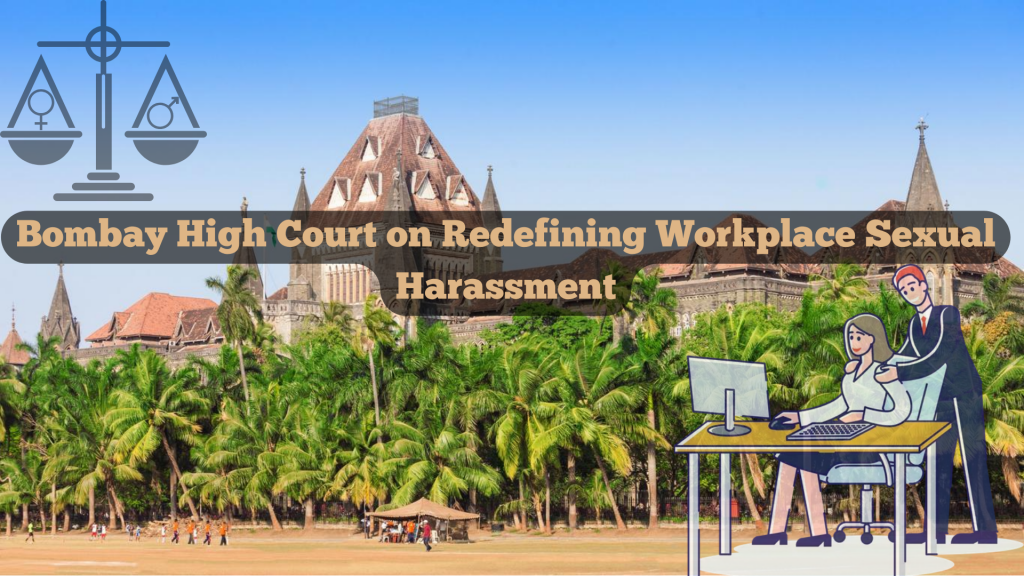
Bombay High Court On Redefining Workplace Sexual Harassment
Judgement Given On : 09/01/2019
Introduction
In a decision dated January 9, 2019, the Bombay High Court shattered conventional notions of workplace sexual harassment. The case of Sapana Korde Nee Ketaki A. Ghodinde v. The State of Maharashtra & Ors. introduced a pivotal shift in understanding workplace harassment by ruling that actions interfering with a woman’s work or creating a hostile work environment constitute sexual harassment.
The case originated from a complaint lodged by the appellant, Sapana Korde, against Bhaskar Gaikwad and other accused parties. Gaikwad, the primary complainant, alleged that Korde, in collusion with her co-accused, engaged in a defamation campaign aimed at coercing him to withdraw his First Information Report (FIR) against them. In response, Korde initiated a counteroffensive by filing a complaint against Gaikwad through email, claiming that he had subjected her to improper behavior and abusive language. Subsequently, an inquiry was initiated by the Internal Committee (IC) to investigate the veracity of Korde’s allegations.
Korde’s complaint explicitly highlighted the impropriety and verbal abuse she had endured at the hands of Gaikwad. Shockingly, the IC unanimously concluded that these allegations did not amount to sexual harassment within the workplace. Instead, they recommended that the matter be addressed by the appropriate Disciplinary Committee. Unfortunately, the IC’s determination failed to consider the statutory provisions encapsulated in Sub-Section (2) of Section 3 of the relevant Act, which explicitly enumerate circumstances constituting sexual harassment in the workplace.
Key Observations of the Bombay High Court
The Bombay High Court made several noteworthy observations in its judgment:
- Expanding the Scope of Sexual Harassment: The Court made a significant departure from the conventional understanding of sexual harassment within the workplace. It asserted that sexual harassment extends beyond mere physical advances, encompassing acts that disrupt a woman’s professional activities or create a hostile, offensive, or intimidating work environment.
- Degrading Humiliation: The Court emphasized that subjecting a woman to humiliating treatment, with discernible repercussions on her physical health or safety within the workplace, unequivocally amounts to sexual harassment.
- Critique of the IC’s Interpretation: The Bombay High Court critically assessed the IC’s failure to categorize Korde’s grievance as sexual harassment. It underscored the IC’s regrettable oversight in comprehending the pertinent legal provisions and the unique factual nuances of the case.
- Absence of False Complaint Allegations: The Court astutely noted that none of the competent authorities had attributed the labels of falsity, malice, or vexation to Korde’s complaint. On the contrary, they acknowledged the complaint as an instance of misconduct and ill behavior occurring between a superior and a subordinate.
Court’s Verdict
In light of the aforementioned pivotal observations and the IC’s apparent failure to consider pertinent legal provisions and case-specific circumstances, the Bombay High Court, exercising its judicial authority, upheld Korde’s appeal. This landmark judgment serves as a clarion call, highlighting the necessity of a comprehensive understanding of workplace sexual harassment. It transcends the conventional confines of overt physical advances and underscores the creation of an intimidating, offensive, or hostile work environment as constitutive of sexual harassment. The case marks a watershed moment in the jurisprudence of workplace sexual harassment. It reveres the conceptual framework wherein the workplace must be secure and inclusive for women. This decision emphasizes the urgency for workplaces to proactively combat all forms of sexual harassment, whether they manifest as physical advances or create a hostile work environment. In doing so, it advances the noble objective of fostering safe, dignified, and inclusive work environments for women in the Indian context. This ruling serves as a beacon, illuminating the path towards a more equitable and respectful workplace for all.
